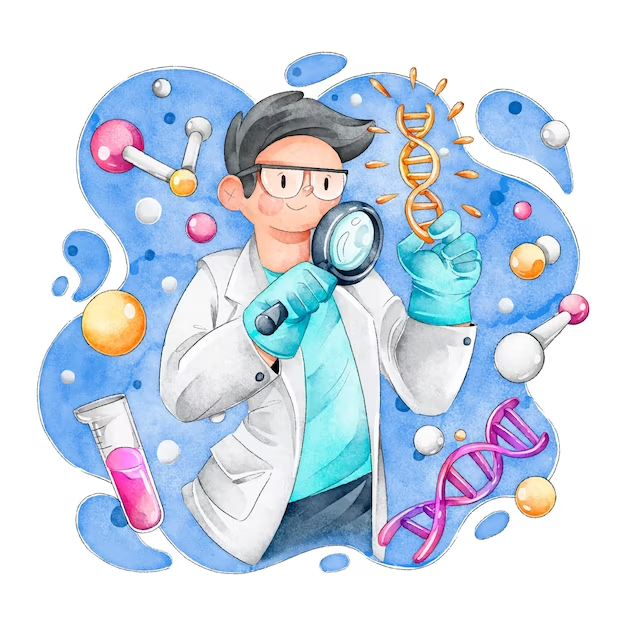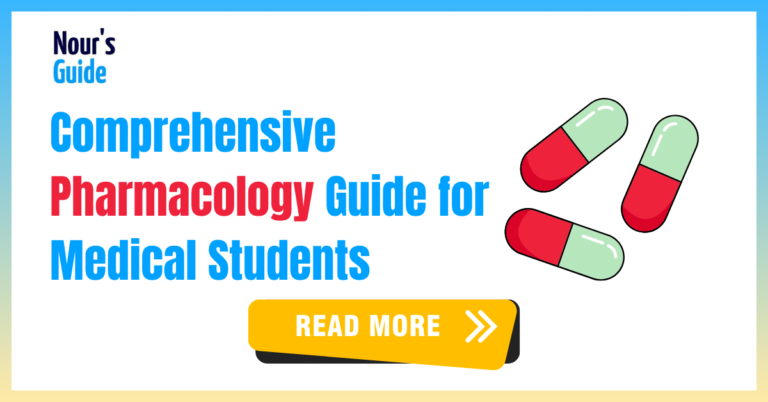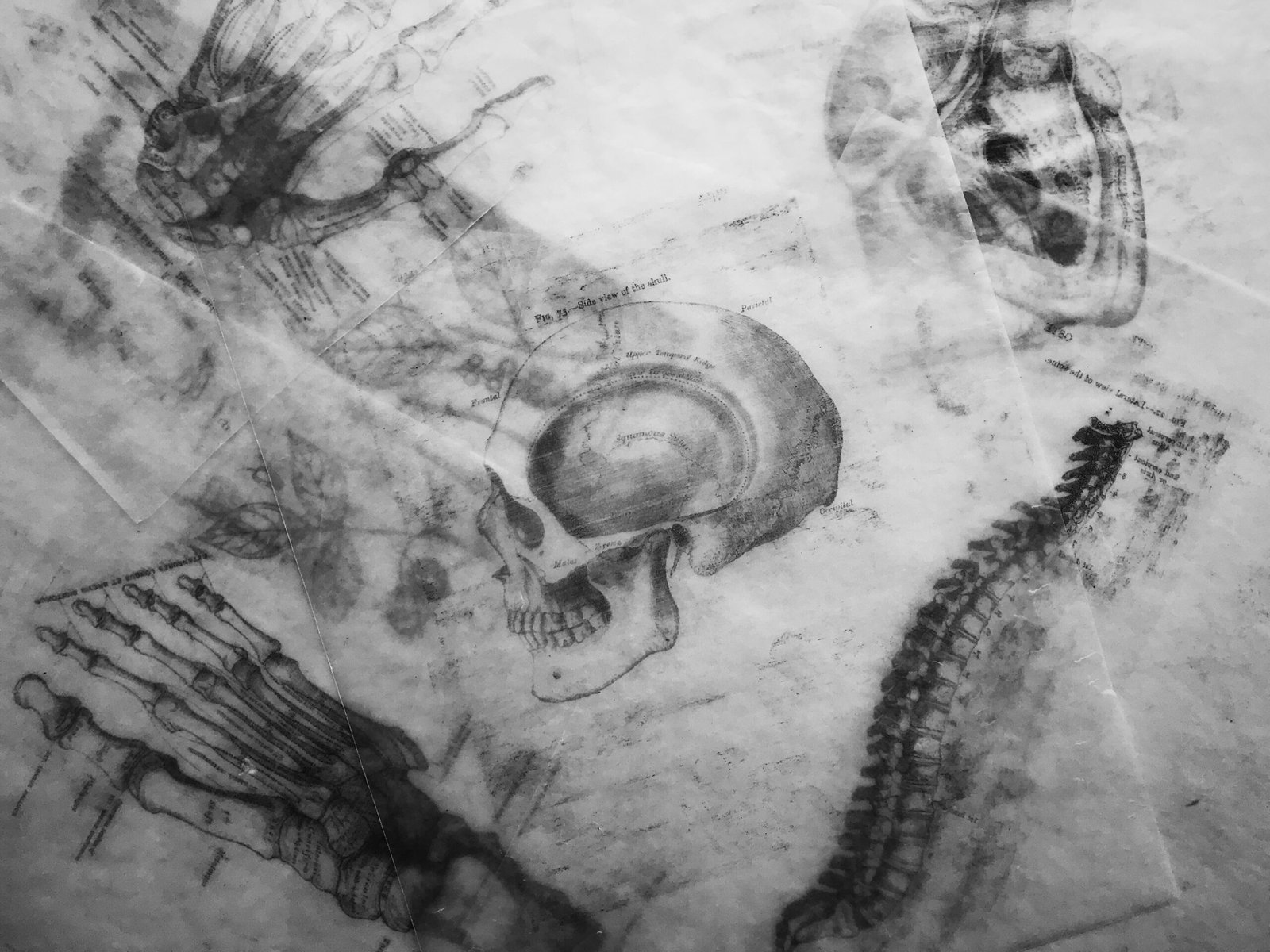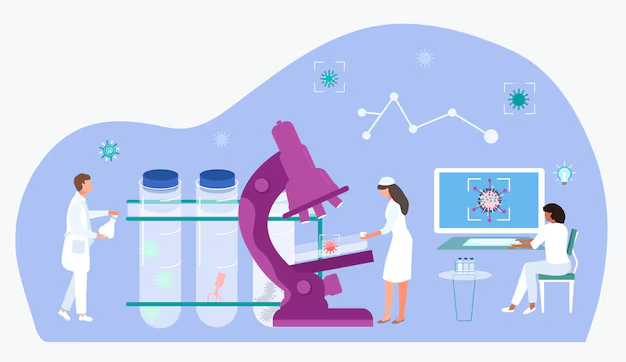2024 Biochemistry Study Guide [For medical students]10 min read

Table of Contents
Building a Strong Biochemistry Knowledge Base:
15 Tips for First-Year Medical Students
- Attend all lectures and take detailed notes, focusing on key concepts and mechanisms.
- Supplement lectures with recommended textbooks and online resources to deepen your understanding.
- Practice regularly with problem sets and past exam questions to reinforce your knowledge.
- Participate actively in small group discussions and labs to apply your learning.
- Create visual aids like diagrams and flowcharts to map out metabolic pathways and regulatory networks.
- Relate biochemical principles to real-world clinical scenarios to see their practical relevance.
- Utilize mnemonic devices and memory techniques to memorize important facts and figures. Sketchy is the best.
- Prioritize understanding over rote memorization, as biochemistry is a highly conceptual subject.
- Collaborate with peers to quiz each other and explain concepts out loud.
- Manage your time wisely, setting aside dedicated study periods for biochemistry.
- Seek help from professors, tutors or teaching assistants when you’re struggling with a topic.
- Get plenty of sleep and exercise to keep your mind sharp during intense study periods.
- Take practice exams under timed conditions to build exam-taking skills.
- Review and reflect on your mistakes to identify knowledge gaps.
- Stay motivated by connecting biochemical principles to your future medical practice.
Top Resources to Study Biochemistry
When it comes to studying biochemistry for medical students, having access to reliable resources is crucial. Here are some top resources that can help you ace your biochemistry exams:
Paid Resources:
Board and Beyond:
Board and Beyond is a comprehensive online learning platform that has become a go-to resource for medical students preparing for (USMLE) Step 1.
Developed by a team of experienced physicians and medical educators, the Board and Beyond Biochemistry course provides an in-depth, high-yield review of the key biochemical concepts and principles that are crucial for success on the USMLE.
The course is structured around short, focused video lectures that break down complex topics into manageable chunks, complemented by detailed slide decks, practice questions, and clinical correlations. Board and Beyond’s biochemistry content is meticulously aligned with the USMLE blueprint, ensuring that students cover all the high-yield material they need to know.
Lecturio
Lecturio offers a comprehensive video library with lectures on biochemistry. Their lectures cover all the essential topics and provide in-depth explanations. You can also find practice questions and quizzes to test your knowledge. Visit Lecturio’s biochemistry practice questions for additional practice.
Kaplan Medical
Kaplan Medical is known for its comprehensive study materials. Their biochemistry books and study guides are highly recommended for USMLE Step 1 preparation. They provide a detailed overview of the key concepts and include practice questions to reinforce your understanding.
Sketchy Biochemistry:
Sketchy Biochemistry is a highly acclaimed visual learning platform that has become an indispensable resource for medical students tackling the challenging subject of biochemistry. Developed by a team of medical educators, Sketchy Biochemistry uses a unique mnemonic-based approach to transform complex biochemical concepts into easily memorable visual stories.
Free Resources:
- Dirty Medicine.
- Ninja Nerd
- Dr. Matt & Mike
- Dr. Najeeb
Best Study Techniques for Biochemistry
Studying biochemistry requires a solid understanding of complex concepts. Here are some effective study techniques that can help you grasp the subject:
Mnemonic Techniques: Remembering Biochemical Pathways and Structures
Mastering the intricate web of biochemical pathways, enzymes, and molecular structures can be a daunting task for many medical students.
However, the skillful use of mnemonic techniques can be a game-changer in building a robust biochemistry knowledge base.
One highly effective mnemonic approach is the use of acronyms and acrostic phrases.
For instance, to remember the steps of the citric acid cycle, students can use the acronym “KAGGIA MAPS” – Krebs, Acetyl-CoA, Glutamate, Isocitrate, Alpha-ketoglutarate, and so on.
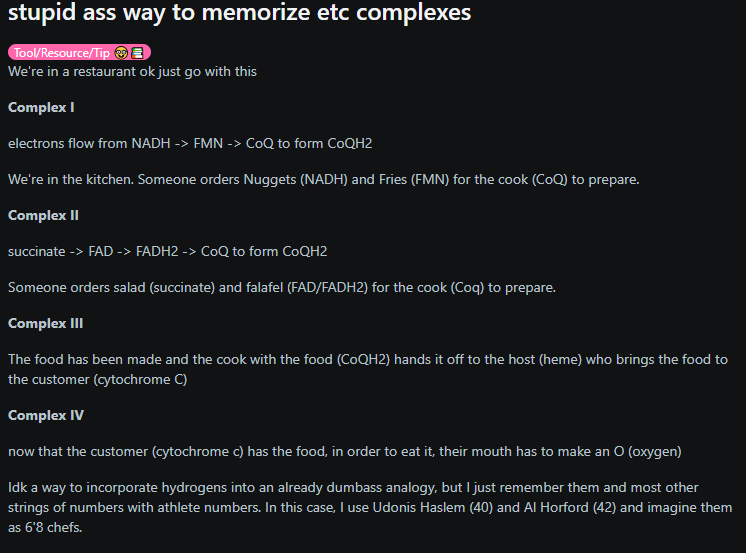
Visual mnemonics, such as drawing simplified diagrams or creating mind maps, can also be incredibly powerful for understanding metabolic pathways and interconnected biochemical processes.
For example, sketching a memorable cartoon character to represent a key enzyme or incorporating vibrant colors to denote different molecular structures can significantly boost long-term retention.
By consistently applying a range of mnemonic strategies, medical students can transform the daunting task of biochemistry into a highly organized, interconnected, and readily recallable knowledge base – a critical foundation for their future clinical practice.
Mind Mapping for Biochemistry: A Powerful Visual Learning Method
- Mind maps organize information in a non-linear, branching diagram structure to show the big picture and relationships between different processes
- For example, a mind map of the citric acid cycle could include:
- The central image of the cycle
- Branching out to show key enzymes, input/output molecules, regulation, connections to other pathways
- Students can customize mind maps with color-coding, symbols, images to make information more memorable and visually striking
- Creating a mind map encourages active engagement – analyzing, synthesizing, and creatively representing biochemical knowledge
- Mind maps provide an excellent study aid and review tool, allowing quick refreshers of complex topics
- Incorporating mind mapping into biochemistry learning helps develop a fluid, flexible mastery of the subject matter for future clinical practice
Time Management Tips for Biochemistry
Managing your time effectively is crucial when studying biochemistry. Here are some tips to help you make the most of your study time:
Create a Study Schedule
Plan out your study sessions and allocate specific time slots for biochemistry. Breaking down your study material into smaller, manageable chunks will make it easier to cover everything.
Prioritize Difficult Topics
Identify the topics that you find the most challenging and allocate more time to study them. By tackling difficult concepts early on, you can ensure a better understanding of the subject.
Biochemistry Exam Preparation Strategies
Preparing for biochemistry exams requires a strategic approach. Here are some strategies to help you succeed:
Practice Past Papers
Practice solving biochemistry questions from previous exams. This will familiarize you with the exam format and help you identify areas where you need further improvement.
Form Study Groups
Join or form study groups with your classmates. Discussing biochemistry topics with others can enhance your understanding and provide different perspectives.
Top 38 High-Yield Topics in Biochemistry
As Doctor Malke Asaad Described in this video here are the 38 most Topics
While studying biochemistry, it is important to focus on high-yield topics that are frequently tested in exams. Here are some key topics to prioritize:
- 1. High-Yield Vitamins
- 2. Thiamine (B1)
- 3. Niacin (B3)
- 4. Folate (B9)
- 5. Cobalamin (B12)
- 6. Ascorbic acid (Vitamin C)
- 7. Retinol (Vitamin A)
- 8. Vitamin D
- 9. Tocopherol (Vitamin E)
- 10. Vitamin K
- 11. Fructose metabolism diseases
- 12. Essential fructosuria
- 13. Hereditary fructose intolerance
- 14. Galactose metabolism diseases
- 15. Galactokinase deficiency
- 16. Classic galactosemia
- 17. Glycogen storage diseases
- 18. Von Gierke disease (Type I)
- 19. Pompe disease (Type II)
- 20. Cori disease (Type III)
- 21. McArdle disease (Type V)
- 22. Lysosomal storage diseases
- 23. Metachromatic leukodystrophy
- 24. Tay-Sachs
- 25. Niemann-Pick disease
- 26. Fabry disease
- 27. Gaucher disease
- 28. Krabbe disease
- 29. Hunter/Hurler syndromes
- 30. Other metabolic diseases
- 31. Cystinuria
- 32. Homocystinuria
- 33. Phenylketonuria (PKU)
- 34. Maple syrup urine disease
- 35. High-yield genetic abnormalities
- 36. Trisomy 13 (Patau syndrome)
- 37. Trisomy 18 (Edwards syndrome)
- 38. Trisomy 21 (Down syndrome)
Biochemistry Practical Skills (Questions)
Developing practical skills in biochemistry is essential for medical students. Here are some practice questions to test your knowledge:
Question 1:
Which of the following is an example of a reducing sugar?
- Fructose
- Sucrose
- Maltose
- Lactose
Question 2:
What is the function of DNA polymerase in DNA replication?
- Unwinds the DNA helix
- Synthesizes new DNA strands
- Proofreads and repairs DNA
- Initiates DNA replication
You can find many quizzes on Telegram Channels Such as Nour’s Guide Channel
Consider Hiring a Tutor
The sheer volume of material and the depth of understanding required can be overwhelming.
To ensure you’re well-prepared and confident in this critical subject, consider hiring a knowledgeable biochemistry tutor.
A specialized tutor can provide personalized guidance, help you understand challenging topics, and develop effective study strategies tailored to your learning style. With their expertise and dedication, you can overcome the hurdles of biochemistry and excel in your medical studies.
How to Choose a Biochemistry Tutor?
When seeking a biochemistry tutor, consider the following factors:
Qualifications
Ensure that the tutor has a strong background in biochemistry and relevant teaching experience. Look for tutors who have successfully helped students in biochemistry.
Teaching Style
Find a tutor whose teaching style aligns with your learning preferences. Some students prefer a more structured approach, while others may benefit from a more interactive teaching style.
Integrating Biochemistry with Clinical Applications
Understanding the clinical relevance of biochemistry is essential for medical students. Here are some ways to integrate biochemistry with clinical applications:
Case Studies
Review case studies that highlight the biochemical basis of various diseases. This will help you understand how biochemistry concepts are applied in clinical practice.
Clinical Rotations
During clinical rotations, pay attention to the biochemical aspects of different patient cases. This will reinforce your understanding of biochemistry in a real-world setting. See Our USCE Guide and our Electives Guide.
Biochemistry Concepts Review Strategies
Regularly reviewing biochemistry concepts is crucial for long-term retention. Here are some strategies to help you review effectively:
Concept Maps
Create concept maps that connect different biochemistry topics. This visual representation will help you see the relationships between concepts and reinforce your understanding.
Anki Flashcards
Use flashcards to review key biochemistry concepts, definitions, and pathways. Regularly quiz yourself to reinforce your knowledge.
Biochemistry Learning Communities
Joining biochemistry learning communities can provide additional support and resources. Here are some ways to connect with others:
Online Forums
Participate in online forums or discussion boards dedicated to biochemistry. Engage in discussions, ask questions, and share resources with fellow students.
Study Groups
Form study groups with classmates who are also studying biochemistry. Collaborating with others can help you gain different perspectives and clarify any doubts.
Biochemistry Research and Careers
Biochemistry offers a wide range of research opportunities and career paths. Here are some areas where biochemistry plays a significant role:
Medical Research
Many medical breakthroughs rely on biochemistry research. Explore opportunities to contribute to medical research projects and gain hands-on experience.
Pharmaceutical Industry
Biochemistry is essential in drug development and testing. Consider career opportunities in the pharmaceutical industry, where you can contribute to the development of new medications.
Disclamer!
If You Are Intrested In Making Money Here Is Our Blog
FAQ
Q: Are there any free resources for biochemistry practice questions?
A: Yes, you can find free biochemistry practice questions on Lecturio’s website. They offer a variety of practice questions to test your knowledge.
Q: Are there any video lectures available for biochemistry?
A: Yes, you can find video lectures on biochemistry on platforms like YouTube. One recommended resource is the video titled “Biochemistry for Medical Students” by MedBullets, available here.
Q: Where can I find additional biochemistry study materials?
A: In addition to the resources mentioned above, you can find study materials on websites like MedBullets (link). These websites provide comprehensive study guides, flashcards, and practice questions.


